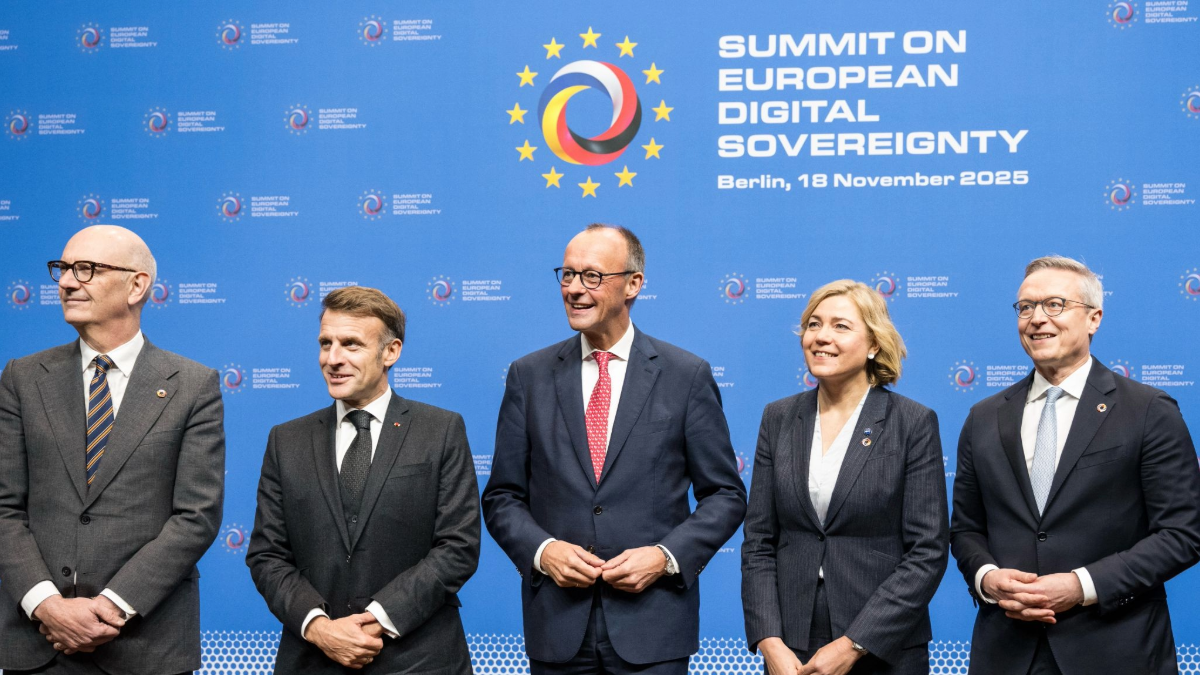At the Sovereignty Summit, Europe Put Start-Ups on Stage and Kept Big Tech in Control
Aline Blankertz / Nov 19, 2025
European leaders pose at the Summit on European Digital Sovereignty in Berlin on 18 November. Source
“First innovate, then regulate” was the core mantra repeated at every opportunity during the French-German digital sovereignty summit in Berlin on Tuesday.
The summit carefully avoided sensitive topics like the trade war or the AI bubble. Instead, its declaration catered to both those who want to promote the European economy and to those who want to avoid meaningful confrontation with the United States. The political announcements — with most EU digital ministers in the audience or on stage — contained few surprises, but delivered more details for various initiatives that are slowly taking shape.
Before putting the announced plans into context, it is helpful to understand who was and was not in the room. Politicians on stage liked to address the audience as the very industry that they hoped to support with their initiatives. Large parts of the program consisted of pitches from European start-up founders and CEOs. Civil society groups were mostly sidelined, except for two short contributions at the end of a panel on digital commons, during which representatives felt compelled to highlight that they also “build solutions.” There was no space for disagreement or debate, but the event seemed intended to drum up support and generate the impression of unity for collective European action in times of geopolitical distress.
Big Tech representatives were notably absent, despite usually dominating meetings with policymakers, as MEPs from the newly launched Democratic Tech Alliance pointed out earlier that day. But assuming Big Tech had no influence at the summit would be naïve. Bitkom, the digital industry association and usual co-organizer of Germany’s annual digital summit, hosted the largest side event at this year’s French-German edition. Though presented as a German group, its membership includes major Big Tech firms, which are rumored to be pressuring against a shift away from their services.
A firework of deregulation and investment promises for companies
As a prelude to Wednesday’s launch of the Digital Omnibus, German and French officials expressed strong support for “simplification,” a deregulatory agenda that has been in the making for some time. Two key elements of the planned Omnibus will be a conversion of the General Data Protection Regulation (GDPR) to a “risk-based approach” and a 12-month delay of the AI Act.
And if deregulation is not enough to “unleash” European innovation, there was much talk about financial market reforms to provide more capital for European companies. Various ministers emphasized that European citizens have significant savings that should somehow be channelled to European companies, but no specifics were provided.
More concrete were the ambitions to give preference to European providers in public procurement. This was a consensus not only among Germany and France, but also included the cross-party tech alliance from the European Parliament. French AI company Mistral and German software firm SAP announced plans to build “Europe’s first fully sovereign AI stack.” Both the French and German governments pledged to adopt the partnership’s solutions over those offered by US tech giants.
However, an open question remains: If regulations are to be rolled back and the role of venture capital is to increase, will European companies behave any differently from US companies? There was clearly more enthusiasm for not losing out in the symbolic race than for holding up European values, whatever they might be in times of a right-wing shift at the EU level. First innovate, then regulate.
Dependencies run deeper than which company to buy from
The pro-EU rhetoric was accompanied by an awkward silence on threats from the US. Instead, the German digital minister Karsten Wildberger and others insisted on “keeping the door open.” Just a few days earlier, the German government had celebrated a €5.5bn investment into German data centres by Google. That a large chunk of the investment will probably flow into the purchase of Nvidia chips, or the environmental impacts did not seem worth mentioning.
What is more, a narrow focus on helping European start-ups and scale-ups to succeed fails to acknowledge the power of Big Tech. Google, Amazon and Microsoft have used investment strategies to capture cloud markets, and Google in particular has amassed an empire of over 6,000 companies it acquired or invested in. Hence, buying from these companies ultimately also benefits Big Tech because they can extract their knowledge and profits.
The capture and control by Big Tech is particularly pronounced in “AI” — the magical technology that most of the discussion at the summit revolved around. France and Germany announced that they “want to create a world-leading environment for public-private development of frontier AI in Europe.” Frontier AI reflects the US strategy that has been misrepresenting AI as a cold war to be won by whoever achieves dominance. China, in contrast, has been pursuing more open models that foster widespread diffusion. If European governments indeed want to enter the imaginary “AI race,” they should be aware that Big Tech companies pursue a range of strategies to plan what is and is not part of the AI research and development agenda, and that catching up will further cement their dominance.
Moonshot-like rhetoric about AI stood in stark contrast to a presentation of the most tangible outcome of the French-German collaboration: a promotional video about a European text-editing tool. But arguably, most European citizens might find that more immediately useful than a frontier AI model.
The cloud gets a DMA silver lining
Despite all the criticism directed at regulation, one piece of regulation received praise: the Digital Markets Act (DMA), a competition regulation to ensure the fairness and contestability of digital markets. Henna Virkkunen brought news from Brussels: The European Commission opened three market investigations related to the DMA and cloud. They are intended to designate two cloud services as core platform services and to assess whether additional DMA provisions are needed for the cloud sector.
Applying and tailoring the DMA to cloud services seems a sensible first step given the key role of the sector. However, the DMA is relatively narrow and inflexible compared to the general prohibition of the abuse of dominance (Article 102 TFEU), raising doubts whether even an updated DMA will be able, on its own, to reverse the concentration in cloud markets. Hence, further steps such as a regulatory approach and/or structural separation might require further exploration.
The add-ons: commons and some open source
In addition to all the industry talk, some uniquely European topics were not entirely lost: One panel was dedicated to the European Digital Infrastructure Consortium for Digital Commons (even though a digital commons representative was uninvited from the panel a week before the summit). The panelists also explored the role of open source; various European open-source associations and organizations signed a “declaration of digital independence” ahead of the summit. However, neither Germany’s Friedrich Merz nor France’s Emanuel Macron mentioned these initiatives. Their closing keynotes showed great creativity for expressing the same mantra in many different ways: First innovate, then regulate.
Authors
